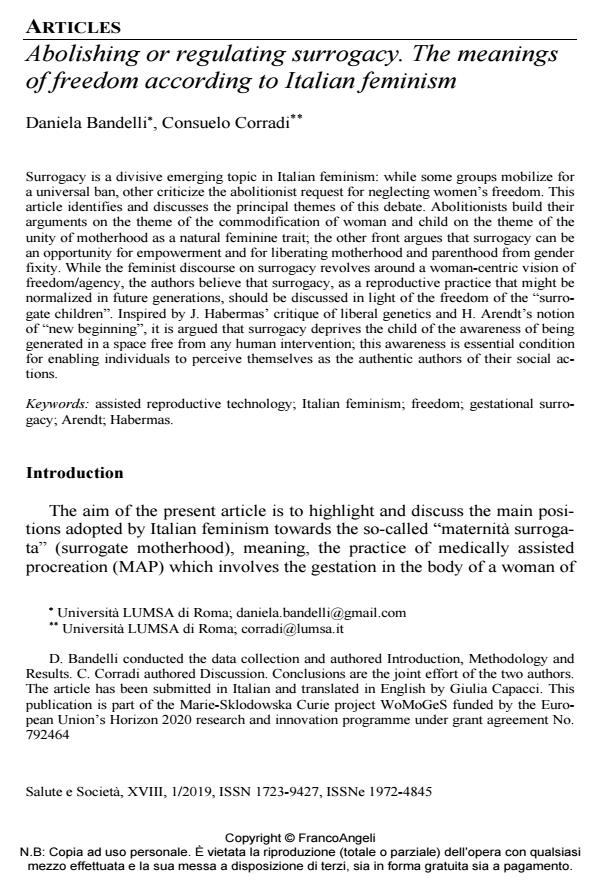Abolishing or regulating surrogacy. The meanings of freedom according to Italian feminism
Titolo Rivista SALUTE E SOCIETÀ
Autori/Curatori Daniela Bandelli, Consuelo Corradi
Anno di pubblicazione 2019 Fascicolo 2019/1
Lingua Inglese Numero pagine 17 P. 9-25 Dimensione file 247 KB
DOI 10.3280/SES2019-001002
Il DOI è il codice a barre della proprietà intellettuale: per saperne di più
clicca qui

FrancoAngeli è membro della Publishers International Linking Association, Inc (PILA), associazione indipendente e non profit per facilitare (attraverso i servizi tecnologici implementati da CrossRef.org) l’accesso degli studiosi ai contenuti digitali nelle pubblicazioni professionali e scientifiche.
Surrogacy is a divisive emerging topic in Italian feminism: while some groups mobilize for a universal ban, other criticize the abolitionist request for neglecting women’s freedom. This article identifies and discusses the principal themes of this debate. Abolitionists build their arguments on the theme of the commodification of woman and child on the theme of the unity of motherhood as a natural feminine trait; the other front argues that surrogacy can be an opportunity for empowerment and for liberating motherhood and parenthood from gender fixity. While the feminist discourse on surrogacy revolves around a woman-centric vision of freedom/agency, the authors believe that surrogacy, as a reproductive practice that might be normalized in future generations, should be discussed in light of the freedom of the "surrogate children". Inspired by J. Habermas’ critique of liberal genetics and H. Arendt’s notion of "new beginning", it is argued that surrogacy deprives the child of the awareness of being generated in a space free from any human intervention; this awareness is essential condition for enabling individuals to perceive themselves as the authentic authors of their social actions.
Parole chiave:Assisted reproductive technology; Italian feminism; freedom; gestational surrogacy; Arendt; Habermas.
- Mother Nature and the nature of motherhood: Gestational surrogacy and ecospirituality as two postmodern forms of sacralization Antonio Camorrino, in Current Sociology /2021 pp.212
DOI: 10.1177/0011392120964894 - Sociological Debates on Gestational Surrogacy Daniela Bandelli, pp.123 (ISBN:978-3-030-80301-8)
Daniela Bandelli, Consuelo Corradi, Abolishing or regulating surrogacy. The meanings of freedom according to Italian feminism in "SALUTE E SOCIETÀ" 1/2019, pp 9-25, DOI: 10.3280/SES2019-001002